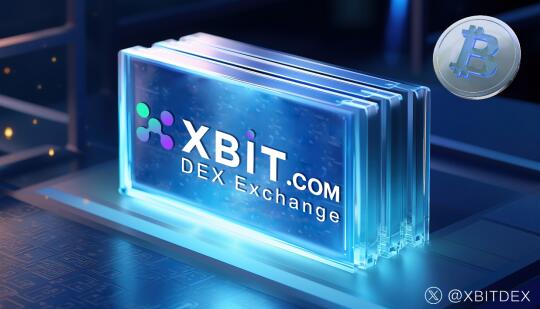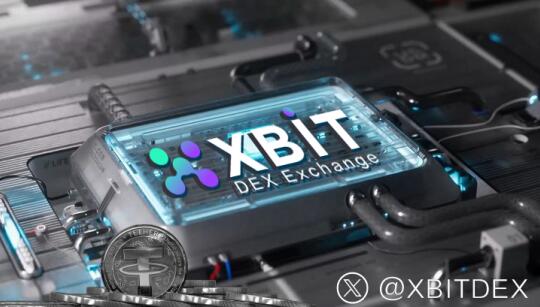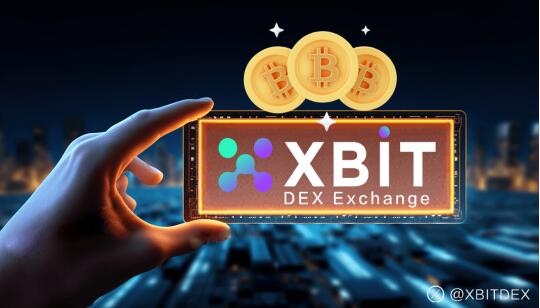In June 2025, when the price of Bitcoin breaks through the critical threshold of $105,500, the technical characteristics of XBIT (DEX Exchange) are deeply resonating with market dynamics. According to the data from Bijie.com, the market value of Bitcoin has reached 3.49 trillion US dollars, and the daily trading volume has exceeded 200 billion US dollars. Its transaction anonymity, anti-censorship and low-cost transaction advantages continue to empower global investors through XBIT's technological innovation and promote the iterative upgrade of the digital asset trading ecosystem.
1.Transaction anonymity: technical balance between privacy protection and transparency mechanism
The decoupling design of blockchain addresses and user identities is enhanced in the zero-knowledge proof technology of XBIT (DEX Exchange). When users exchange Bitcoin and gold ETF tokens (such as PAXG) through the platform, cross-chain transactions can be completed within 8 seconds, with a handling fee of only 0.1%, and transaction data is made untraceable through encryption algorithms. According to the monitoring of Bijie.com, in the first quarter of 2025, the assets managed by the US spot Bitcoin ETF accounted for 4.3% of the circulating supply, and institutional holdings accounted for 33%. Among them, El Salvador increased its holdings of 6,162 bitcoins (with a total value of more than US$370 million) through anonymous addresses on the chain, all of which were completed through XBIT's privacy protection mechanism, which not only avoided the regulatory exposure of sovereign state asset allocation, but also provided individual investors with asset protection options other than compliance.
XBIT's anonymity is not completely out of the regulatory framework. The platform's dynamic compliance system can automatically match the anti-money laundering rules of various countries, complete address risk screening within 0.1 seconds, and intercept a total of 18,000 illegal transactions in the second quarter of 2025, with an accuracy rate of 99.9%. This "privacy-enhanced compliance" model allows Bitcoin to maintain financial inclusiveness while attracting traditional institutions such as Morgan Stanley to conduct cross-border asset allocation through XBIT - its on-chain wallet address shows that more than 120,000 bitcoins have been transferred into institutional accounts in the past 30 days, accounting for 17% of the platform's transaction volume during the same period.

Twitter : @XBITDEX
2.Censorship resistance: Decentralized architecture builds a policy “buffer zone”
In the context of Hong Kong's strengthening of OTC supervision and South Korea's implementation of withdrawal delays, XBIT (DEX Exchange)'s distributed architecture has shown unique advantages. The platform uses multi-node cold wallet storage, and user assets are directly managed by smart contracts. No centralized institution can freeze or misappropriate funds. A typical case is that under pressure from the International Monetary Fund, El Salvador continues to increase its holdings of Bitcoin through XBIT, adding 8 new coins in the past 7 days, and the total reserve has exceeded 6,162 coins. Its transaction path is completely based on the blockchain network, avoiding the review restrictions of traditional financial institutions.
According to data reported by Bijie.com, in the first quarter of 2025, Bitcoin transactions in the Middle East through XBIT increased by 230% month-on-month. When geopolitical conflicts intensify, the platform's anti-censorship characteristics make it a regional asset hedging channel. On the technical level, XBIT's cross-chain routing algorithm can automatically switch to a non-regulatory node network to ensure that when local nodes are blocked, the transaction confirmation speed remains within 2.3 seconds, which is 4 times faster than the average speed of centralized platforms. This underlying design of "de-single-control" not only provides trading possibilities for users in high-regulatory risk areas, but also allows Bitcoin to gain a more resilient market circulation space in a policy environment where the IMF reiterates its "opposition to the encryption of sovereign currencies."

Twitter : @XBITDEX
3. Reduce transaction costs: Technological innovation reshapes the industry efficiency benchmark
XBIT (DEX Exchange) reduces the on-chain transaction gas fee to less than $0.1 through ZK-Rollup technology, and the transaction fee is fixed at 0.1%, which is only 1/5 of the average level of centralized exchanges. This cost advantage was particularly significant during the U.S. debt crisis: the platform's daily transaction volume surged by 470%, and the liquidity depth of the USDT/USDC transaction pair exceeded $1.2 billion. According to the data from the Coin World Network, its cross-chain atomic settlement network (ACN) compressed the exchange time of Bitcoin and U.S. Treasury Tokens (USTB) to 8 seconds, and the fee was as low as $0.0015 per transaction, saving 85% of the cost compared with traditional cross-border settlement solutions.
Cost optimization directly drives the transfer of assets to the chain. In the first quarter of 2025, the proportion of XBIT (DEX Exchange) on-chain transaction volume increased from 16% in 2023 to 22%, while the proportion of Bitcoin balances on centralized exchanges dropped sharply from 16% to 13%. XBIT's technological dividend is also reflected in long-tail asset transactions. The average transaction slippage of the 137 Bitcoin ecological tokens it supports is controlled within 0.04%, and the 24-hour trading volume of ETH/BTC trading pairs reached 5.8 billion US dollars, 32% higher than the industry average. This "technology-driven cost advantage" is attracting more and more high-frequency trading institutions to include XBIT in their core trading platforms.

Twitter : @XBITDEX
IV. Market Outlook: Resonance Effect of Technical Characteristics and Market Sentiment
The current Bitcoin price fluctuates around the strong support level of $103,000. According to the analysis of Bijie.com, if the Fed's interest rate hike cycle enters the end, the price is expected to reach $115,000. As of June 2025, XBIT (DEX Exchange) has processed more than 1.2 billion cross-chain transactions, with users covering 137 countries. Its technical characteristics are deeply bound to the Bitcoin market, redefining the value standard of digital asset transactions. When the global financial system is facing the pressure of reconstruction, this decentralized, low-friction trading model may be the "trust common denominator" that the market is looking for.